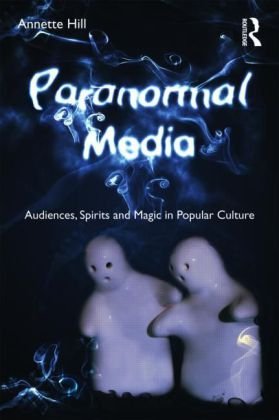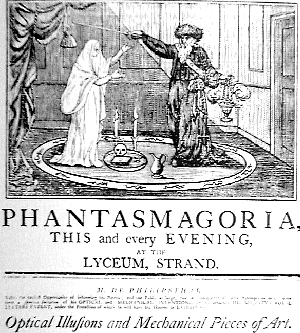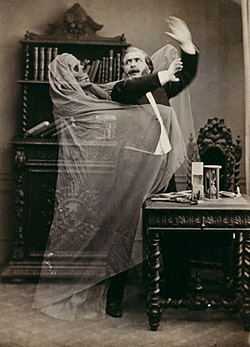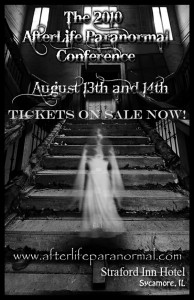 In my ongoing research into various facets of the paranormal in popular culture I have been fortunate to connect with some interesting people. One of the most recent is Annette Hill, author of Paranormal Media: Audiences, Spirits and Magic in Popular Culture (London and New York: Routledge, 2011).
In my ongoing research into various facets of the paranormal in popular culture I have been fortunate to connect with some interesting people. One of the most recent is Annette Hill, author of Paranormal Media: Audiences, Spirits and Magic in Popular Culture (London and New York: Routledge, 2011).
Paranormal Media offers a unique, timely exploration of the extraordinary, unexplained and supernatural in popular culture, looking in unusual places in order to understand this phenomenon. Early spirit forms such as magic lantern shows or the spirit photograph are re-imagined as a search for extraordinary experience in reality TV, ghost tourism, and live shows. Through a popular cultural ethnography, and critical analysis in social and cultural theory, this ground-breaking book by Annette Hill presents an original and rigorous examination of people’s experiences of spirits and magic. In popular culture, people are players in an orchestral movement about what happens to us when we die. In a very real sense the audience is the show. This book is the story of audiences and their participation in a show about matters of life and death.
Hill is Professor of Media at the Communication and Media Research Institute, University of Westminster, UK. She has authored numerous books and articles on television and popular culture, including Restyling Factual Television (2007) and Reality TV (2005).
TheoFantastique: Annette, thank you for letting me take a look at your book, and for given me an opportunity to explore the paranormal once again on this blog, this time from the perspective of media and popular culture. How did you become personally interested in this as a research topic in relation to your work in media?
Annette Hill: It happened on the night of Halloween. A few years ago I was watching Most Haunted Live on the TV. It was fascinating to see such a reality TV show and how it invited the audience to participate in so many ways – from being scared, or laughing out loud, to texting, or sending in your psychic drawings. At the time, I was finishing a book called Restyling Factual TV and in that book the conclusions were all about a problem of evidence, truth, and authenticity. I started to imagine what it would be like to do a study of something where evidence was even more problematic.
It led to this book and its focus on ambiguous cultural experiences where evidence is only one of many factors at work in something that may or may not be paranormal. For example, what was so interesting about studying viewers of Most Haunted was that many were skeptical of the program, but that didn’t mean they were skeptical of paranormal matters. One woman I spoke to said the show opened a door to talking about the paranormal, and I think that was true for many participants in the study. I called this a revolving door of skepticism and belief – summing up the ambiguity in watching and experiencing reality ghost hunting TV.
TheoFantastique: In Paranormal Media you discuss not only paranormal phenomena, but specifically how audiences interact with and participate in such phenomena, especially in a media age. Can you sketch a little of the history of audience participation with the paranormal historically?
 Annette Hill: The first point to make is that the paranormal has been a part of culture for a long time. Telling ghost stories around the campfire is something we all know about, both historically and from our experiences today. During the revolution in communications in the 19th century, the paranormal was used as a rich source for early popular culture in Europe and America. For example, there was the invention of photography, and very soon after this there was something called the spirit photograph. Social historians tell us that people went to see spirit photographs exhibited at Cheapside in London and debated the authenticity of them, just as we would today. For some people it was evidence of spirit communication, for others a trick of light. Crucially, in chatting about this, people shared their own ghost stories as well. It is this type of participation in the paranormal that makes it such a continuing rich source for popular culture now. Ghosts, phantasmagoria, unusual experiences, are topics that invite us to talk, share, debate, test out and exchange ideas and beliefs.
Annette Hill: The first point to make is that the paranormal has been a part of culture for a long time. Telling ghost stories around the campfire is something we all know about, both historically and from our experiences today. During the revolution in communications in the 19th century, the paranormal was used as a rich source for early popular culture in Europe and America. For example, there was the invention of photography, and very soon after this there was something called the spirit photograph. Social historians tell us that people went to see spirit photographs exhibited at Cheapside in London and debated the authenticity of them, just as we would today. For some people it was evidence of spirit communication, for others a trick of light. Crucially, in chatting about this, people shared their own ghost stories as well. It is this type of participation in the paranormal that makes it such a continuing rich source for popular culture now. Ghosts, phantasmagoria, unusual experiences, are topics that invite us to talk, share, debate, test out and exchange ideas and beliefs.
TheoFantastique: How does the current interest in the paranormal in popular culture play a part in our narrative of selfhood in Western culture?
Annette Hill: Psychologists point out that paranormal beliefs are usually grounded in our experience of something strange or extraordinary. This intuitive, experience-based belief tends to bring to the fore our sense of self and what we may or may not believe in regarding the paranormal. Time and again participants in my study told me they had to experience it to believe it. Certainly this focus on the self fits very well with the popularity of self-help, psychology of empowerment, and health and well being, which are all connected in various ways with paranormal beliefs today. On the one hand you can see various professionals within the paranormal and psychic industries promoting their services as self-help and empowerment. On the other hand, you can also see skeptics of the paranormal criticizing people’s beliefs because of their supposed gullibility, or self-deception. Both skeptics and believers are using a sense of self, psychology, and personal experience to debate paranormal matters. But, we should not forget that for people who engage with the paranormal in popular culture – movies, photography, ghost cams, ghost hunting events, live medium demonstrations on TV – the social side of all this is very important. So, the paranormal is not only about selfhood, but also feeling a collective self-conscious engagement with the extraordinary, or unexplained.
 TheoFantastique: You suggest that Western culture’s perspective on death plays a major role in the popularity of the paranormal. At one point you quote Durham Peters saying that “our modern sensibility to death and dying ‘bespeaks a disturbance in that most crucial of all relationships our relation to the dead.'” At Burning Man Festival one of the more popular and emotionally moving aspects is the Temple, where participants leave memorial wishes to the dead and at the conclusion of the festival the Temple is burned. The event is cathartic for participants. I’m wondering if such aspects of popular culture, including even the continued popularity of Halloween, even with its commercialism and secularization, is part of a dynamic similar to the connection between Western views on death in relation to the paranormal.
TheoFantastique: You suggest that Western culture’s perspective on death plays a major role in the popularity of the paranormal. At one point you quote Durham Peters saying that “our modern sensibility to death and dying ‘bespeaks a disturbance in that most crucial of all relationships our relation to the dead.'” At Burning Man Festival one of the more popular and emotionally moving aspects is the Temple, where participants leave memorial wishes to the dead and at the conclusion of the festival the Temple is burned. The event is cathartic for participants. I’m wondering if such aspects of popular culture, including even the continued popularity of Halloween, even with its commercialism and secularization, is part of a dynamic similar to the connection between Western views on death in relation to the paranormal.
Annette Hill: One of the most frightening facts I read for this book was in a sociological study of death and dying. The author claimed that a hundred years ago around 70 per cent of us would have died with family, friends or people from the local community. Today, the reverse is the case – 70 percent of us will die alone, probably in an institution. Who wants to die alone? Our fear of death is a major part of how we play with ideas of mortality, death and dying, and afterlife, in popular culture. Live events and rituals of the kind you mention are so important for our collective self-conscious engagement with death and dying in society. Whilst Julian Barnes can write on mortality and fear of death and say there is nothing to be afraid of, most of us feel the opposite.
TheoFantastique: You refer to our situation as an age of anxiety. Is our interest in the paranormal, and the depth of cultural angst, fueled by our environment of post-9/11, economic recession, and terrorism?
Annette Hill: The age of anxiety is a term used by a cultural historian Joanna Bourke in her book on fear. It is a good book that shows how the whole of the twentieth century has been filled with anxiety, atrocity, war, and civil unrest. 9/11 is one such terrible moment in a history of fear. The psychological interpretation of the rise in paranormal beliefs today is that it is a way of coping with uncertainty. This idea is so common that Marketing Week forecast that during the economic recession there would be a boom in psychic services. But, this is only one interpretation. People I spoke to had other interpretations of why interests in the paranormal are peaking at the moment, some of which are about alternative spiritual practices, or belief in afterlife. The World Values survey shows belief in afterlife is steadily rising. That may be another factor in paranormal beliefs.
 TheoFantastique: At one point you refer to the paranormal not so much as religion but more as lifestyle experiences, which of course can incorporate the spiritual. I’ve noticed the same dynamic in my research in Burning Man Festival in the United States. Can you touch a little on how you see the paranormal shifting from religion to lifestyle experience through media and cultural participation?
TheoFantastique: At one point you refer to the paranormal not so much as religion but more as lifestyle experiences, which of course can incorporate the spiritual. I’ve noticed the same dynamic in my research in Burning Man Festival in the United States. Can you touch a little on how you see the paranormal shifting from religion to lifestyle experience through media and cultural participation?
Annette Hill: When I say the paranormal is less about religion than lifestyle practices I am referring to the way the paranormal is played out in popular culture. A few hundred years ago our belief in the paranormal would have been rooted in religion. Now, it may be linked to alternative religions, Eastern and Western spiritual practices, or different kinds of religious doctrines, but it doesn’t have to be. One person I spoke to said just because I don’t believe in God it doesn’t mean I don’t believe in anything. For my participants, there was something attractive about the eclecticsm and openness they associated with paranormal beliefs.
TheoFantastique: You state in your book that the paranormal is a neglected area of research in many areas of academic study? Why do you think this is the case? Even with its widespread presence in popular culture is it in the minds of some a marginalized set of phenomena that in turn can marginalize scholars in the academy?
Annette Hill: The study of the paranormal is a challenge for any researcher. Parapsychologists have their own methods and theories, psychologists have their approaches to the study of psi, and religious and sociological studies offer other perspectives. It is a neglected area in media, cultural and communication studies probably because scholars worry about how to study something they perceive as irrational. But, the paranormal is a part of our human experience, whether we believe in it or not, and I think it is important we find rigorous ways to study this.
TheoFantastique: Annette, thank you again for your research and this interview.
Related posts:
“Bader, Mencken, and Baker: Paranormal America”
“Jeffrey Kripal – Authors of the Impossible: The Paranormal and the Sacred”





2 Responses to “Annette Hill: Paranormal Media”